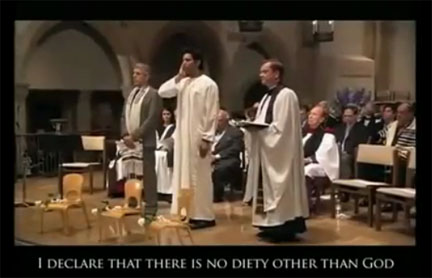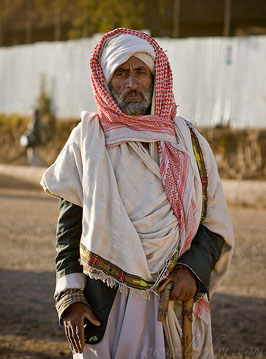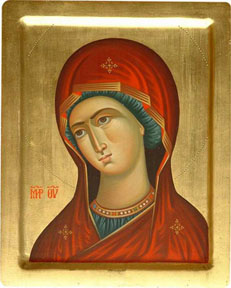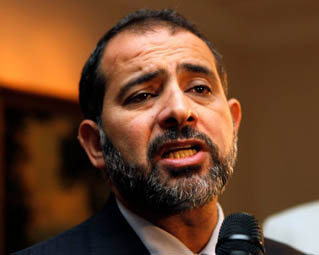
There is a beautiful recording on Youtube of an azan given at an interfaith gathering at a cathedral by Algerian Ben Youcef

There is a beautiful recording on Youtube of an azan given at an interfaith gathering at a cathedral by Algerian Ben Youcef

Whatever you think about “religion,” you must admit that “religion” is not something that can be avoided. There are countries where a person has little choice but to accept the dominant religion imposed and there are places where one can shop for religion more easily than clothes. As an anthropologist I accept the fact not only that we have evolved (even if Darwin did not start a religion) and that all members of Homo sapiens that have been encountered and studied have something that deserves to be called “religion,” even if only in the minimalist sense of Victorian Quaker Edward Tylor that religion is at bottom a belief in spirits. There are many religions out there and several important scholarly organizations devoted to the study of religion in one way or another, but add a new one to the mix.
Anthropologist Gabriele Marranci, founder of the journal Contemporary Islam, has formed the Worldwide Association for the Study of Religion (WASR perhaps for those who like acronyms) If you do not have a Facebook account, join the Wiki.
This group is open to scholars studying religion or with an interest in religion and aims to develop a worldwide association accessible to any scholar or student wherever they might live. This is a working group to develop ideas and the structure for this new association, which aims also to remove the gap between scholars working in developing countries and those in the West. This group is open to scholars studying religion or with an interest in religion and aims to develop a worldwide association accessible to any scholar or student wherever they might live. As scholars the goal of the association to study religion in all its forms and not to lobby for any particular religion or even for the absence of religion. This is a working group to develop ideas and the structure for this new association, which aims also to remove the gap between scholars working in developing countries and those in the West.
As Marranci notes, his effort is not to replace organizations like the American Academy of Religion, but to expand the network of scholars who study religion worldwide. With the Internet and Skype, scholars are no longer captive to meeting colleagues at professional meetings, important as these remain. Feel free to join today and tell your friends.
On Facebook; you can request joining (which is free) by clicking here. You can also join via the Wiki.

Muslim Hadramis in “Christian Ethiopiaâ€: Reflections on Boundary Making Processes
by Samson A. Bezabeh, Bergen University
[Note: This is the Introduction to a recent article on the Hadrami experience in Ethiopia. The full article can be downloaded from the Journal of Muslim Minority Affairs.]
Introduction
Throughout recorded history sporadic population migration from Arabia to East Africa and Ethiopia has been a noted phenomenon. In the modern era Hadramis started to migrate and settle in Ethiopia at the end of the nineteenth century and the beginning of the twentieth century. Thus, by the beginning of the twentieth century, Ethiopia hosted a number of Arab families who were mainly Yemeni or Hadrami by origin. Although the exact population of the Hadramis at that time is not known, various statistical estimates and narrations, including narration of present day Hadrami families indicate that their number was substantial. This is particularly true in the case of major Ethiopian towns and trading centres such as Harar, Jimma and Asmara.
Despite their pronounced presence, however, their numbers, declined during the second half of the twentieth century as a result of negative factors that have forced them to leave the country. One such factor was the movement of pan-Arab nationalism which gained momentum in the 1960s. To be more specific, in 1969 Hadramis were expelled from Ethiopia for “supporting†the Eritrean Liberation Front (ELF), whom Arab nations, particularly Syrians and Egyptians, were supporting for fulfilling their goal of creating a united Arab land which in their vision also included the highlands of northern Ethiopia. In this scenario, Hadramis along with other Arabs were accused by the Haile Selassie regime4 in Ethiopia of sympathizing with the Arab backers of the Eritrean Liberation Front (ELF), and hence undermining Ethiopian unity. This has led many Hadrami families to voluntarily and involuntarily relocate themselves to Yemen and to oil reach countries in the Gulf such as Saudi Arabia. Continue reading Muslim Hadramis in “Christian Ethiopiaâ€

Illustration: Theotokos, Virgin Mary, Albanian icon
Bismillah al-Rahman al-Raheem. In the name of God, the Merciful, the Compassionate.
. . .And make mention of Mary in the Scripture, when she had withdrawn from her people to a place in the East, and had chosen seclusion from them. Then We [God] sent unto her Our Spirit and it assumed for her the likeness of a perfect human being. She said: “Truly I seek refuge in the Merciful One from you, if you are God-fearingâ€. He said: “I am only a messenger of your Lord, to give to you a pure sonâ€. She said: “How can I have a son when no man has touched me, neither have I been unchasteâ€? He said: “Even so. Your Lord says: ‘It is easy for Me. And that We may make of him a revelation for humanity and a mercy from Us, and it is a thing ordained’â€. And she conceived him, and she withdrew pregnant with him to a distant place. And the pains of childbirth drove her to the trunk of a palm-tree: She cried out: “Oh! Would that I had died before this! Would that I had been a thing forgotten and unseen!†Then (a voice) called out to her from beneath her: “Do not grieve, for surely your Lord has made a stream to flow beneath you; And shake towards you the trunk of the palm tree, it will drop on you fresh ripe dates: So eat and drink and refresh yourself. Then if you see any person, say: ‘Surely I have vowed a fast to the Merciful One, so I shall not speak to any one today’â€. Then she brought the child to her own people, carrying him. They said: “O Mary! You have come with an amazing thing. O sister of Aaron! Your father was not a wicked man nor was your mother an unchaste womanâ€. Then she pointed to the child. “But they said, ‘How shall we speak to one who is still in the cradle, a little child?’ Jesus said, ‘Behold, I am God’s servant; God has given me the book and made me a prophet. God has made me blessed, wherever I may be; and God has enjoined me to pray and to give alms so long as I live, and likewise to cherish my mother; God has not made me arrogant or unblessed. Peace be upon me the day I was born, and the day I die, and the day I am raised up alive’â€. Qur’an, Chapter of Mary, (19:16—35)
Good evening, al-salaamu alaikum, peace be upon you all.
I am, as ever, honoured to be here with you on this blessed night at Trinity-St. Paul’s. It is a great joy to be back in this church, both in the primary meaning of that word as this gathering of people, and in the secondary meaning of this amazing physical space that we share. Continue reading Tabsir Redux:Mary in the Qur’an

Most people find it hard to take cartoons seriously, apart from political satire and that can become a deadly issue, depending on the target. Given the recent Danish cartoon controversy it would seem that comics and religion do not mix well or at least settle well for the believers who see themselves as the target. But what about comic relief for the political struggle between Israel and the Palestinians? Fundamentalist tract artist Jack Chick, whose comic empire is dedicated to winning souls for Christ by drawing on God’s hate, has been using his pen to spread a rather sinister version of the fundamentally reduced Gospel for over 40 years. One of his more recent offerings is called “The Squatters†and it provides a virtual roadmap to apocalypse. Continue reading Tabsir Redux: Apocalypse Watch: The Man Who Knows Squat

You may remember that May 21, 2011 was supposed to be the day the music stopped, well at least Gospel songs, since all the “real” Christians were supposed to be raptured into the air so that all hell could finally break loose here on earth. This was one of several predictions of the apocalypse by Rev. Harold Camping, who runs a “Family Radio” Bible-debasing empire. When May 21 passed, Rev. Camping when back to the numbers and lo and behold there was a new date of October 21, 2011. As he put it on his website, which has not been changed in the past several days:
Thus we can be sure that the whole world, with the exception of those who are presently saved (the elect), are under the judgment of God, and will be annihilated together with the whole physical world on October 21, 2011, on the last day of the present five months period. On that day the true believers (the elect) will be raptured. We must remember that only God knows who His elect are that He saved prior to May 21.
Mr. Camping and his followers are still here, so either the date is wrong again or perhaps the truth is that all the “real” Christians were indeed raptured out of this world but in fact there were none left, even Billy Graham, for the big event. There are a number of Christian groups who insist other Christian groups are not really Christian, such as the attack on Mitt Romney as a heretic Mormon or the man who on the day after the world was supposed to end disrupted a canonization ceremony in the Vatican and burned a Bible. Given that there are also Muslim groups which insist certain other Muslim groups are not really Muslim, perhaps there are no “real” believers at all, at least not in the narrow sense of the Campings and Ibn Taymiyas of this world.
This time around, without the “Family Radio” media campaign on billboards, there were other important news items; there were actually plenty of important news items back on May 21 as well, but this time there were no annoying reminders on Facebook that the secular jig was up. There will be more dates proposed and no doubt more gullible individuals will stand ready to be beamed up to Beulah Land. Camping might take some note of hope in the fact that Turkey has just experienced an earthquake, although it came a couple of days after the “for sure” Biblical date. And, after all, Turkey is mainly a Muslim country. But then we had a quake here on the east coast a month or so ago (perhaps Camping believes our President is secretly a Muslim, like some 20% of Americans and 30% of Republicans apparently think).
You might be wondering why yet another failed end-of-the-world prediction by a Bible-belabored Christian who thinks he is one of the few “real” Christians is worth a commentary on a blog devoted to thoughts on Islam and the Middle East. For most Americans, even the bulk of self-styled “evangelicals,” Camping represents a lunatic fringe. As the votes are being tallied in Tunisia, Egypt prepares for a vote, Libya begins the process of picking up the pieces after Qaddafi’s exit and Yemen is still waiting for Godot (I mean Ali Abdullah Salih) to go, there is a fear among many Americans that after the dictators another form of lunacy will take hold: Muslims who argue that only “their” way of being Muslim is valid. Actually, this problem is quite widespread and it is not as simple as Sunni vs. Shi’a, although that is an old and convenient fault line. Continue reading Camping Out for the Rapture

Photograph by Murad Sezer/Reuters
A Man of God and Technology, Trying to Steady Libya
By ANNE BARNARD, The New York Times, September 16, 2011
Tripoli, Libya
AREF NAYED was sipping cappuccino in the soaring marble lobby of the Corinthia Hotel near Tripoli’s seafront, quoting Montesquieu on law and Augustine on forgiveness in a conversation that had begun with earthier subjects, like the challenges of restoring Libya’s water supply and counting its dead.
He held forth on how Bedouin poetry shaped a moderate Islam in Libya, and he was just starting to explain the relevance to Libyan politics of the mathematical theory of complexity — it had to do with something called “flocking phenomena†— when his cellphone rang.
“I have to take this,†he said, glancing at the number. “Somebody wants to surrender.â€
An associate of Col. Muammar el-Qaddafi, the deposed Libyan leader, wanted safety guarantees before turning himself in. Mr. Nayed wanted to make it happen, and not just because fostering reconciliation is one of his many jobs for Libya’s de facto government.
He is also a Muslim theologian who, in addition to running a technology business, spent his time before the Libyan rebellion writing erudite papers arguing that compassion is the paramount value in Islam, that pious Muslims can thrive within a liberal secular state and that even the most righteous ones should adopt a “humble recognition†of their own fallibility.
Now, as the Transitional National Council’s coordinator of a Libyan stabilization team being asked to solve problems like fuel shortages and human rights abuses, he suddenly finds himself in an ideal laboratory to test his signature theological propositions — and to try to make them government policy.
“I don’t think there should be a witch hunt, purges or cleansings,†he said Monday at the hotel cafe, adding that those who committed crimes under Colonel Qaddafi should be tried. “Any time you deal with human beings with that kind of terminology, you end up with unfairness and persecution.†Continue reading Montesquieu, St. Augustine and Libya